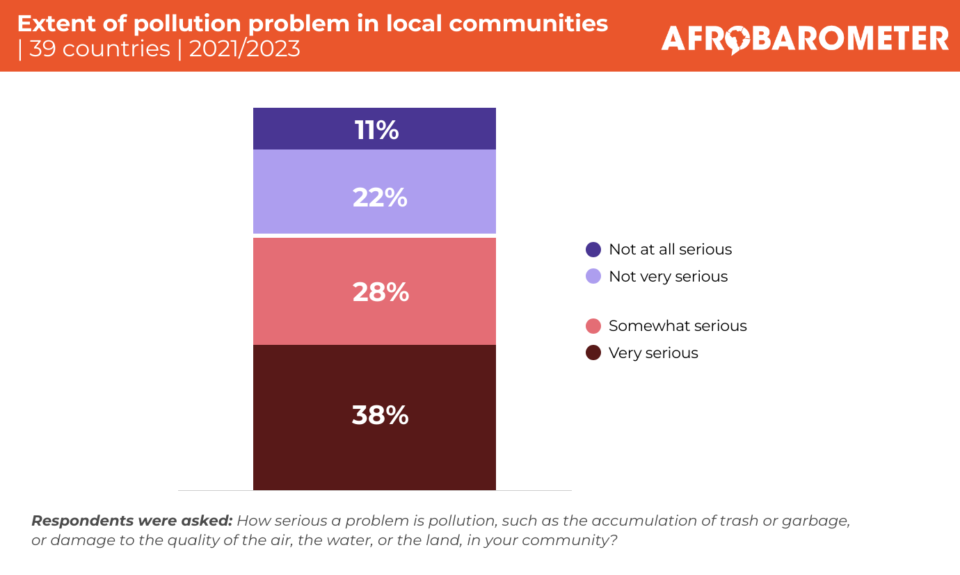Believe In Shared Responsibility For Containing It, Afrobarometer Study Shows
A majority of citizens across 39 African countries say environmental pollution is a serious problem in their communities, an Afrobarometer study reveals.
Trash disposal, including plastic waste; deforestation; pollution of water sources; poor sanitation or human waste management; and air pollution are cited as the most important environmental concerns in local communities.
Africans are most likely to point to members of the public as bearing the primary responsibility for limiting pollution. But a vast majority also want their governments to do more to protect the environment, with nearly universal support for this view in Tunisia. The only countries where this position is not endorsed by a majority are Namibia and Mauritania.
Africans are slightly more likely to see the benefits of natural resource extraction as outweighing its costs, but there is widespread agreement that the industry should be more tightly regulated.
Key findings
- On average across 39 countries, two-thirds (66%) of Africans say environmental pollution is a serious problem in their communities (Figure 1).
- Citizens identify trash disposal, including plastics, as the leading environmental problem in their communities (cited by 27%), followed by deforestation (19%) and water pollution (17%) (Figure 2).
- Deforestation (28%) stands out as the foremost environmental concern in rural areas, while trash disposal (37%) tops the list in urban communities.
- Almost half (46%) of respondents say ordinary citizens bear the primary responsibility for reducing pollution and keeping communities clean, but nearly as many believe that the government – either national (24%) or local (19%) – should take the lead. Only a handful assign a primary role to business and industry (5%) (Figure 3).
- A significant plurality (45%) of Africans say the benefits of natural resource extraction, such as jobs and revenue, outweigh the costs, such as pollution. But 38% believe the costs are greater and a notable minority (17%) are undecided on this issue (Figure 4).
- Three-quarters (76%) want their governments to regulate natural resource extraction more tightly to reduce negative environmental consequences.
- An overwhelming majority (78%) want their governments to do more to limit environmental pollution (Figure 5).
- This sentiment is nearly universal in Tunisia (97%) and reaches nine in 10 citizens or more in Kenya (91%), Cote d’Ivoire (90%), Eswatini (90%), and Guinea (90%).
- The only countries where this position does not receive majority support are Namibia (49%) and Mauritania (45%).
Afrobarometer surveys
Afrobarometer is a pan-African, non-partisan survey research network that provides reliable data on African experiences and evaluations of democracy, governance, and quality of life. Nine survey rounds in up to 42 countries have been completed since 1999. Round 9 surveys (2021/2023) cover 39 countries.
Afrobarometer’s national partners conduct face-to-face interviews in the language of the respondent’s choice that yield country-level results with margins of error of +/-2 to +/-3 percentage points at a 95% confidence level.
Charts
Figure 1: Pollution is a serious problem in the community | 39 countries | 2021/2023
| 100% 80%
60% 40% 20% 0% |
90 | 88 | 88 | 82 | 81 | 80 | 78 | 78 | 77 | 77 | 75 | 72 | 71 | 71 | 70 | 69 | 69 | 67 | 67 | 66 | 66 | 66 | 64 | 64 | 64 | 62 | 60 | 58 | 58 | 57 | 56 | 565453535249484745 |
Respondents were asked: How serious a problem is pollution, such as the accumulation of trash or garbage, or damage to the quality of the air, the water, or the land, in your community? (% who say “somewhat serious” or “very serious”)
Figure 2: Most important environmental issue in the community | by urban-rural location | 39 countries | 2021/2023
Respondents were asked: Which of the following is the most important environmental issue in your community today?
Figure 3: Who should be responsible for reducing environmental pollution? | 39 countries | 2021/2023
Respondents were asked: Who do you think should have primary responsibility for reducing pollution and keeping your community clean?
Figure 4: Natural resource extraction: Costs vs. benefits and regulation | 39 countries | 2021/2023

